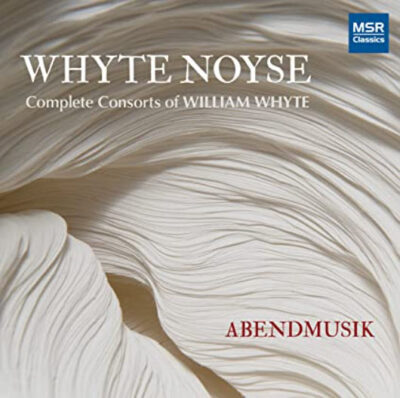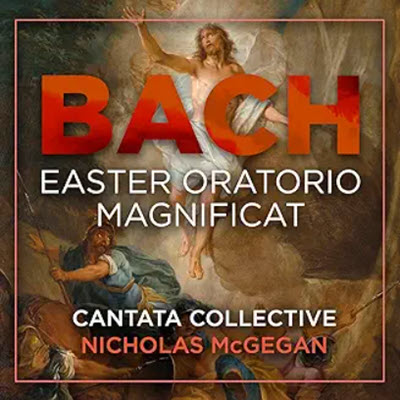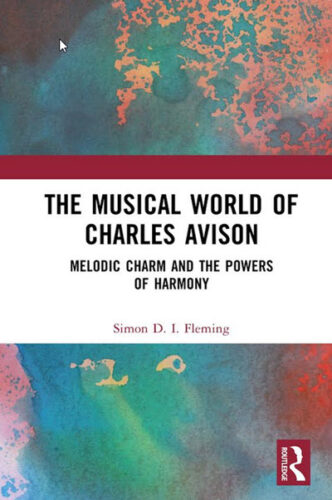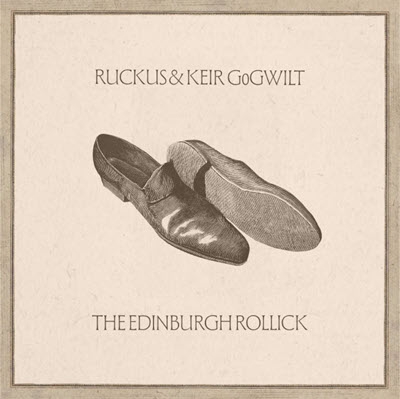by Jacob Jahiel
Published May 15, 2023
Whyte Noyse: Complete Consorts of William Whyte. Abendmusik. MSR Classics, MS 1840
When an ensemble records the work of neglected composers for the first time, two very different questions arise: Why would anyone want to play this? Or, alternatively, Why hasn’t this been done before?
In the case of New York-based string ensemble Abendmusik’s new album Whyte Noyse, billed as the first recording of the complete viol consorts of William Whyte (1571– ca. 1634), it’s the latter question.

The answer, it seems, might have more to do with a lack of biographical knowledge than compositional quality. While his music is not unknown to today’s viol players, Whyte still represents a mysterious figure in the musicological record. (Whyte? White? Wight? The composer’s name can be found in a variety of spellings, although it’s most frequently spelled “White” in academic sources, the online IMSLP score database, Grove Online, and elsewhere.)
Whyte clearly garnered the respect of both peers and future generations, earning praise from composers such as Thomas Mace, Christopher Simpson, and John Playford, as well as a dedication in one of Thomas Tomkins’s madrigals.
It’s not hard to see why Whyte was held in such regard: his compositions are rich, imaginative, and varied—in short, unworthy of the neglect they have suffered in concert spaces and discographies. They are vividly brought to life by Abendmusik’s musicians: viol players Sarah Cunningham, Lawrence Lipnik, Rosamund Morley, Patricia Ann Neely, and Carlene Stober; and violinists Judson Griffin and Małgorzata Ziemnicka.
Violinists playing viol consorts? In this repertoire, mixing instrument families will undoubtedly raise a few eyebrows. Anticipating such a challenge, Neely’s liner notes offer historical justification, for instance pointing to the sheer number of patrons and composers of viol consort music who also were accomplished violinists. Circumstantial evidence, to be sure. But the supposed immutability of like-family instruments in consort music may also be overstated: Christopher Simpson described his Fancies as being “generally”—but not exclusively—“conceived for viols,” and John Dowland’s famous Lachrimae notably calls for “lute, viols, or violons.”
Perhaps these exceptions prove the rule, but Neely rightly concludes, “Without placing too much emphasis on historical orchestration and speculation, it is most important, nevertheless, that the execution of the music reflect the beauty, sentiment, and intention for which it was created.”
As far as musical standards go, there are none higher, and regardless of whether they hold their instrument on their shoulder or between their knees, Abendmusik’s musicianship proves equally high. From the robust, six-part Pavan that begins the album, to the wistful Fantasia that marks its conclusion, the balance between voices proves excellent, the articulation crisp, and the musical shaping impeccable. If the term “consort” can be understood not merely as a prescribed instrumentation, but rather as an ideal for immaculately-blended sound, then these players are indeed a true consort.
Although consort music generally prizes sensitivity and musicianship over virtuosity, Whyte still offers plenty of moments to show off—and Abendmusik’s musicians deliver. While he can write tightly-knit polyphony as well as anyone, Whyte has a tendency to veer off into intimate, lengthy, and highly-exposed paired duets. This constant shift of voicing generates an alluring variety of musical textures and moods, all skillfully elucidated in this recording.
While white noise may be thought of as something relegated to the background, with Whyte Noyse, Abendmusik successfully foregrounds an under-appreciated body of work. They make a successful case that consort musicians should welcome William Whyte onto their stands—and maybe even fiddle players into their jam sessions.
Jacob Jahiel is a writer, editor, and viola da gambist currently living in Montréal. He was a fellow at the 2022 Rubin Institute for Music Criticism’s Emerging Writers Program. For EMA, he has written about the 2022 Viola da Gamba Society’s Conclave.




